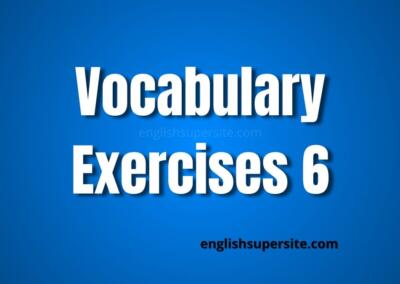
What is an idiom in English?
An idiom is a phrase or expression with a figurative meaning rather than a literal meaning. Examples of idioms in English include “it’s raining cats and dogs” to describe a heavy downpour, “beat around the bush” to describe avoiding the main topic, and “biting off more than you can chew” to take on more than one can manage.
List of Most Common English Idioms
A – C
(someone’s) two cents
Someone’s opinion about something.
Each of you will have a chance to put in your two cents about the subject.
add fuel to the fire
To make the problem worse!
- She was adding fuel to the fire!
add fuel to the flame
To make the problem worse!
- She was adding fuel to the flame!
a needle in a haystack
Something almost impossible or extremely difficult to find.
- I can’t find it; it is like looking for a needle in a haystack.
a piece of cake
Extremely easy.
- I can do that, that’s a piece of cake!
back and forth
Backward and forward.
- He was pacing back and forth before the meeting.
beating around the bush
To delay or try to avoid talking about an unpleasant subject.
- Stop beating around the bush and tell me the truth!
bite off more than you can chew
Try to do something that is too hard for you to take on more than one can manage. Take on a commitment one cannot fulfill.
- Mary was so eager to jump into the new project, but she quickly realized she had bitten off more than she could chew.
- I think he has bitten off more than he can chew taking all that work!
break a leg
Good luck.
- I know you have a test tomorrow, so go there and break a leg!
call it a day
To stop doing something for the rest of the day.
- I am really tired, let’s call it a day!
compare apples and oranges
To compare things that are completely different.
- He is comparing apples and oranges. We are talking about books, not movies.
couch potato
A lazy person does not go anywhere and only stays at home watching TV.
- Let’s go to the mall and walk around, don’t be such a couch potato.
cut corners
To minimize efforts or expenses; to do things carelessly or incompletely.
- Don’t cut corners when you are dealing with public safety!
cut (someone) some slack
To treat someone in a less critical way
- I am doing my best! Please, cut me some slack!
D – L
days are numbered
Used to say that something will end soon.
He knows that his days are numbered as the team’s coach.
driving (one) bananas
Making me crazy.
- These kids are driving me bananas today!
get over it
Forget about it, forget about the past.
- She broke up with him, and now he must get over it.
get your feet wet
Experience something for the first time; to become slowly familiar with it.
- I volunteered at a hospital to get my feet wet before becoming a doctor.
go the extra mile
To go beyond what is necessary and required.
- He is always willing to go the extra mile to help his family.
hang in there
to persevere, to keep going, trying, to continue despite difficulties
- Even if the progress is slow, hang in there; you will be fluent in English.
have a lot on your plate
To have many things to do or a large amount of work to do.
- He can’t take this new project right now; he has a lot on his plate.
have stumbled upon
To accidentally bump into something or discover something
- She stumbled upon an ancient map in the library.
hit the hay
Go to bed.
- I am going to hit the hay. Goodnight!
hit the nail on the head
To do or say something correct; to be exactly right.
- Your explanation really hit the nail on the head.
if the shoe fits
Used to tell someone that undesirable or critical comments made about them are most likely true or fair.
- A: Are you calling me a liar?
- B: Well, if the shoe fits, wear it.
in a nutshell
To say something in a very brief way; in a few words.
- Please, tell me the story in a nutshell.
keep up with the Joneses
To always want to own the same expensive items and do the same activities as your friends and neighbors.
- Many people try to keep up with the Joneses by buying expensive cars and phones that they cannot afford.
kick the bucket
To die.
- He kicked the bucket last night.
kill two birds with one stone
Solve two problems at once with just one action.
- Please drop this mail on your way to the store, that way you are going to kill two birds with one stone.
let sleeping dogs lie
To leave a problem or situation alone to avoid making things worse.
- Please, don’t mention that fight; let sleeping dogs lie!
M – T
miss the boat
To lose an opportunity to do something by being slow to act
- He didn’t buy that house; he really missed the boat.
out of the blue
To say that something happened unexpectedly.
- That ball that hit my head while I was walking came out of the blue.
once in a blue moon
Very rarely.
- The boss only comes around once in a blue moon!
practice makes perfect
Say this to encourage someone to keep practicing to become better at something.
- To become a good dancer, you should practice. Remember, practice makes perfect!
rain on someone’s parade
To ruin someone’s plans.
- I hate to run on your parade, but we can’t have dinner together tonight.
rolling in the aisles
Laughing very hard.
- The comedian had the kids rolling in the aisles.
safe and sound
Not hurt or unharmed; free from danger or injury.
- Hello mom, I just wanted to tell you that I arrived in New York safe and sound.
stand your ground
To refuse to change your opinion or accept an argument.
- I tried to convince my mother to buy a smaller car, but she stood her ground.
so far, so good
Everything is going as planned up to this moment in time.
- A: How is your new job?
- B: So far, so good!
take (something) to heart
To be deeply affected; to think about it seriously.
- Please, don’t take her criticism to heart.
take into account
To take into consideration.
- You must take into account that she is still learning English.
take the bull by the horns
To deal with a problem or difficult situation immediately and directly.
- He decided to take the bull by the horns and solve that problem today!
take your time
There is no need to hurry!
- Do not worry, take your time to choose the right color.
the ball is in your court
You have to take the next action or make a decision in a situation.
- What are you going to do about this project? The ball is in your court!
the cherry on (top of) the cake
Anything that improves or makes perfect something that is already good.
- This amazing view is not our main reason for buying this house, but it’s the cherry on top of the cake!
the straw that broke the camel’s back
The last event, in a series of events, that you can no longer continue to accept a bad situation.
- It had been a terrible week, so when the car broke down, it was the straw that broke the camel’s back.
tie the knot
Get married.
- After 10 years together, they will finally tie the knot!
to make a long story short
To skip unnecessary details and get to the point.
- Long story short, he sold the car!
U – Z
under the weather
Feeling sick or ill
- I am feeling a bit under the weather today!
what goes around comes around
Use this expression when you want to say that things go in cycles and that the way you treat others will eventually return to you.
- You should not mistreat her. What goes around comes around.
when pigs fly!
Never!
- He is only going to pay his student loan when pigs fly!
when hell freezes over!
Never!
- I am going on a date with him when hell freezes over!
you reap what you sow
The outcomes are determined by your actions.
- Time will show you that you reap what you sow!
you scratch my back, and I will scratch yours
Tell someone that if they help you, you will help them.
- I will help you with your math homework if you help me with my project. You scratch my back, and I will scratch yours.
Extra:
Don’t sweat it.
Don’t worry about it. Relax!
- I know the computer cannot be fixed, but don’t sweat it, we can buy a new one!
Study Also:
Abbreviations Cohesion and Coherence Collocations Comparative Conditionals Frequent Errors Future Continuous Future Perfect Future Perfect Continuous Future Simple Homonyms Interjections Journaling Learn English Linking Words Logical Flow Past Continuous Past Perfect Past Perfect Continuous Past Simple Plural Present Continuous Present Perfect Present Perfect Continuous Present Simple Pronunciation Question Tags Quiz Quotes Simple Future Simple Past Simple Present Spelling Superlative Transition Words
Share with your friends!






